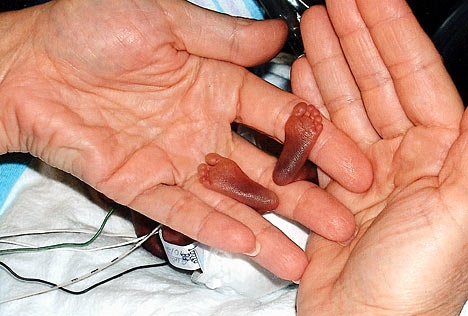“My wife would not want to remember that tragic event [the loss of an almost full-term baby after a forced fatal injection of drugs into the baby] as she has just overcome the trauma, so I request that you not speak to her,” said Alimcan Karluk, head of the research center at the East Turkistan Association, an İstanbul-based organization working to raise awareness about the problems faced by Uighurs in East Turkistan.
His wife is one of the thousands of Uighur mothers who have lost their unborn babies due to China’s forced abortion policy. China, which introduced a controversial one-child-per-family policy in 1979 as a measure to alleviate social, economic and environmental problems in the country, has been forcing Uighur mothers in East Turkistan to have abortions despite the fact that ethnic minorities are among the exemptions to this law. The abortion law went into effect in China in 1984 and has been more strictly implemented in East Turkistan since 1988.
According to the 1979 law, the number of children married urban couples can have is one, but the law allows exemptions in several cases, including rural couples, ethnic minorities and parents without any siblings themselves. Nevertheless, the policy has been implemented in East Turkistan with heavier sanctions, raising suspicions among many of whether the Chinese government is trying to assimilate the Turks in the region.
East Turkistan, which is referred to as Xinjiang by China, has been under the control of China since 1949. There are around 30 million Muslim Turks in the region, which has an area of 1,828,418 square meters. Uighurs make up only 1 percent of the Chinese population. It is estimated that 800,000 forced abortions have been carried out in East Turkistan since 1979.
Forced abortions are often performed very late in pregnancy -- even in the ninth month. Sometimes the baby’s skull is crushed with forceps as it emerges from the birth canal. Either the woman or her husband is forcibly sterilized.
Karluk left the Urumqi region of East Turkistan with his family after the Gulja massacre on Feb. 5, 1997, when Chinese security forces brutally cracked down on a peaceful demonstration in the city of Gulja, killing thousands in the ensuing clashes. He talked about the tragic loss of his unborn child to Sunday’s Zaman.
“The incident took place in 1996. I was out of Urumqi when some Chinese health officials visited our house for a health check. My wife was eight months pregnant with our second son. She said the health officials told her that she cannot have a second child since she has one child already and so her pregnancy had to be terminated. They gave her a shot which caused her to deliver a dead baby,” said Karluk, adding that his wife needed psychological support to overcome the trauma of her aborted pregnancy.
He said some 15-16 families in their neighborhood had to experience the same tragedy at that time. Abortions carried out in the region’s southeastern parts, where the population is less educated compared to the northern parts, are performed in more violent ways with the seven or eight-month-old fetuses being taken from the mothers’ womb in unhygienic conditions.
In rural areas of East Turkistan, 40 percent of these pregnancies are aborted forcefully, while this figure is 30 percent in the urban parts of the region, according to a report prepared by the East Turkistan Solidarity Association.
Experts note that if China continues to implement this policy in East Turkistan, preventing Uighur families from having more than one child, natural population growth will halt in the region this year.
Karluk said the Chinese policy against Uighurs was aimed at assimilating the Uighur population in the region as the Chinese government was tolerant of Chinese families there having more than one child. It was even dispatching more Chinese there in order to turn the balance of the population in favor of the Chinese.
According to official census figures in the report, the Chinese population in East Turkistan increased by 31.64 percent in 2000 when compared to a decade ago, while the increase in the population of Uighurs was 15.89 percent during the same period.
Looking at this picture, the head of the East Turkistan Solidarity Association, İsmail Cengiz, said that China forcing Uighur mothers to abort in East Turkistan despite the fact that abortion is considered a sin in the Islamic faith was not only a violation of minority rights but also a move aimed at assimilation.
Karluk said China imposes heavy sanctions on families that oppose the abortion of the second pregnancy, such as taking away land the family owns or cutting off their electricity or water. Putting the father or mother in jail is the heaviest penalty.
He also said Uighur families were desperate because there is no authority they can appeal to in order to sue the Chinese government over the forced abortion policy; cases filed against the government have been concluded in favor of the government.



